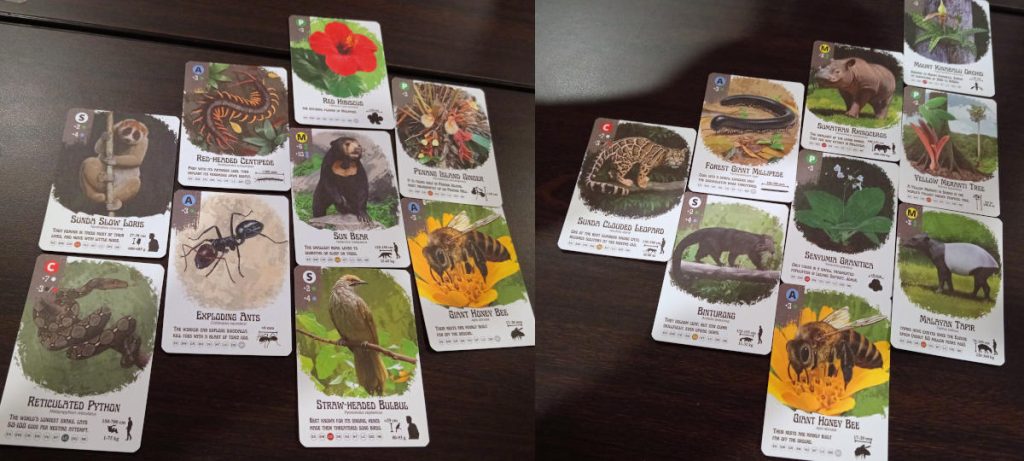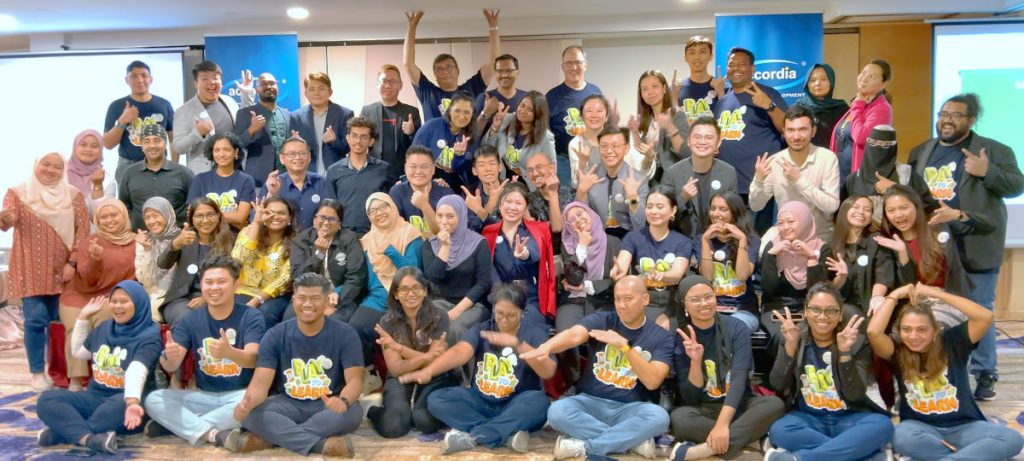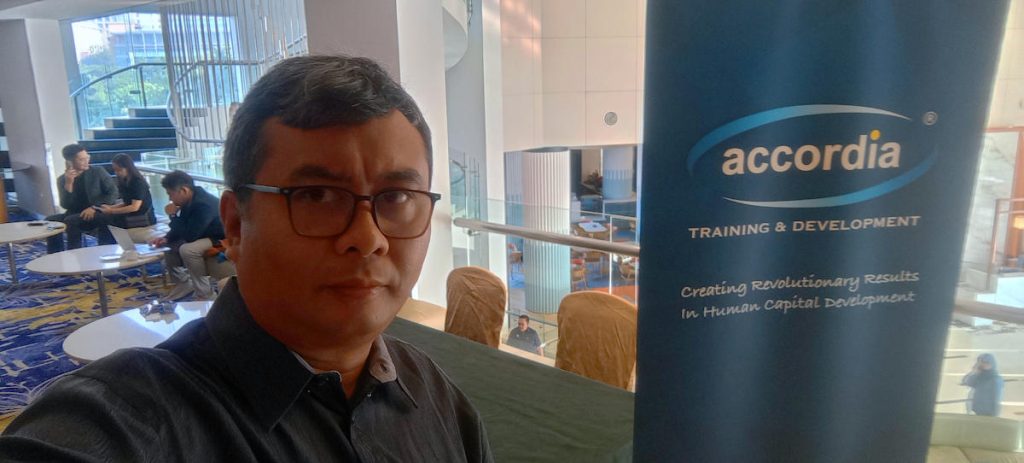
At the Mezzanine Level of the Everly Putrajaya Hotel
And so it came to pass that I attended the 4th Malaysian Simulation And Gaming Conference (MASAGA) 2024 at The Everly Putrajaya Hotel as a representative of UniMAP. Accordia Training and Development organised the conference. A couple of months ago, Mr. Jegatheeswana Manoharan of Accordia invited me to speak as a tertiary education educator. I met Jega during the Facilitating Change via Gamification workshop in February 2019.
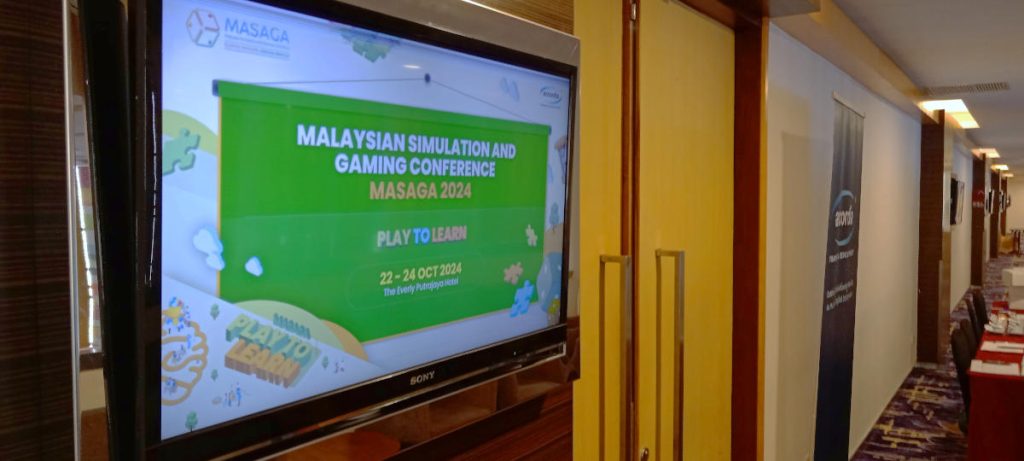
Our Conference was held in the Irama 5 room.
MASAGA 2024’s tagline is “PLAY TO LEARN”. I heartily agree with their philosophy where if you play as you learn, you would be a better learner. Among the attendees were other educators (from as far as India, Afghanistan and Yemen), corporate trainer, game designers, researchers and even human resources officers.
Day One
The keynote speaker on the first day was by Brian Remer, the former president of NASAGA (North American Simulation And Gaming Association), after the introduction by the organisers.
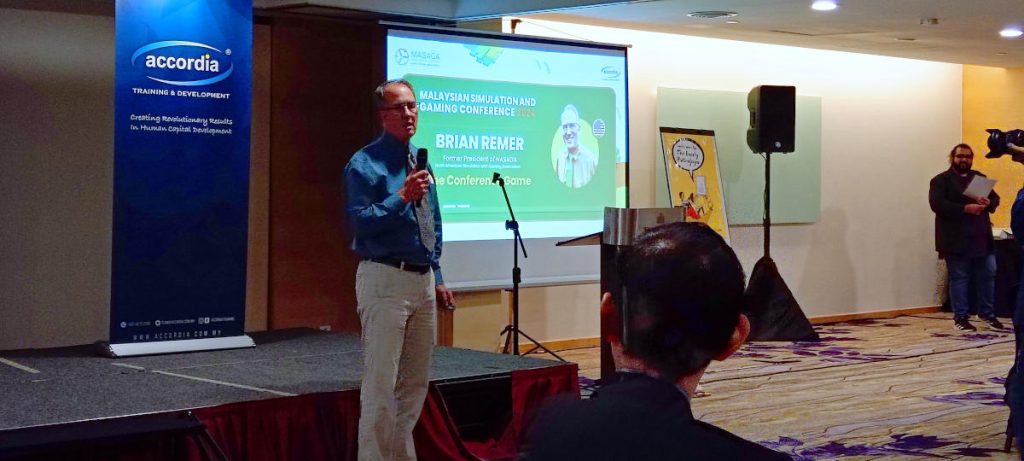
Brian Remer leads with The Conference Game
One of the things he spoke about was infinite games where a game can extend indefinitely based on its mechanics. Definitely a concept I can use to describe tabletop role-playing games (TTRPGs). Brian also conducted the first game activity for MASAGA, where groups were assigned to “gamify a conference”. Our ad hoc group was given the task of “Building Our Reputation”.
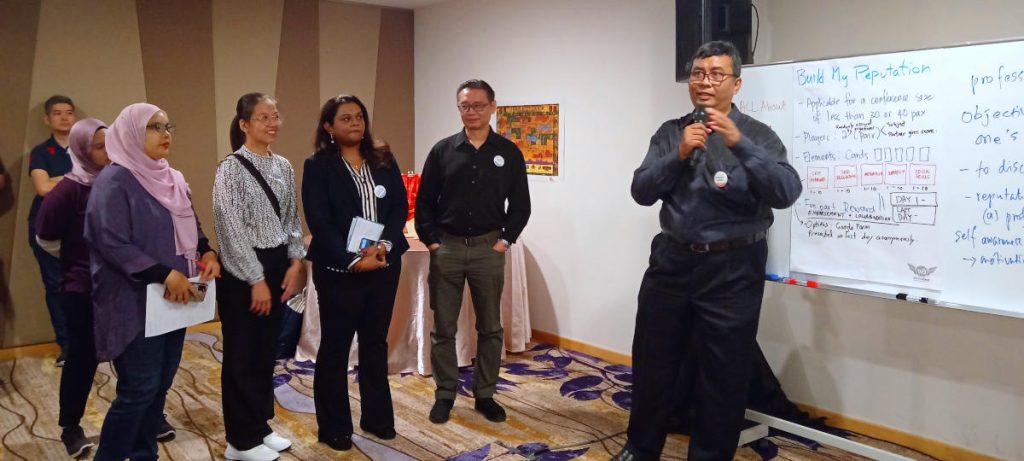
Building reputation during a conference by “Secret Santa” using cards, then Google Forms concluding with evaluation of attendees
Soon it was time for tea break.
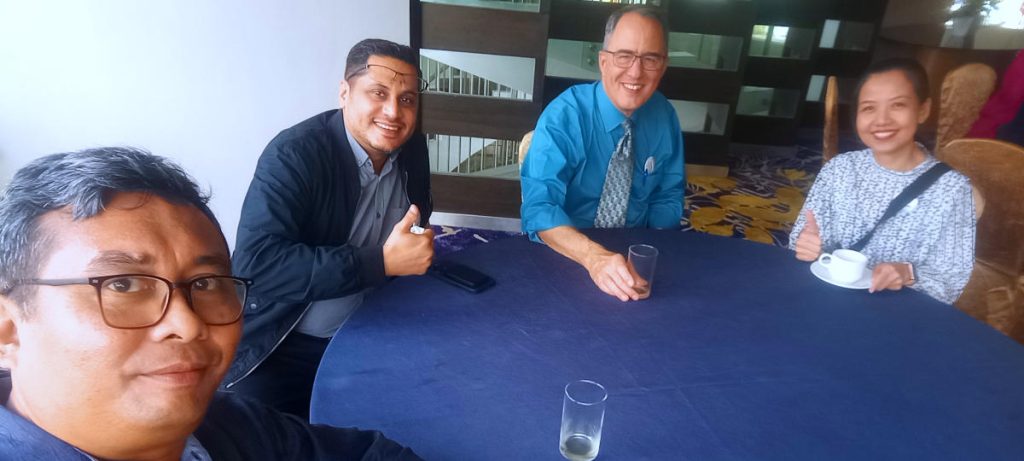
Representatives from UniMAP, UiTM, NASAGA (former president) and Teach For Malaysia.
Sudden Games, Emotions and Storytelling
There were other presentations “Tailoring Games for Children with Learning Challenges” by Woon Dak Yin. The next was “Integrating Games into Tertiary Education” — something I myself am trying to do — by Kamalashne Jayapalan. Then, “Adapt, Modify, Play and Learn” by Priya Nanthagopal, followed by “Gamify Emotions for Success and Happiness” by Jones Liew of Singapore. The last one has a “mood matrix” with an extensive vocabulary which can help with designing games scenarios which require players to describe emotions accurately.
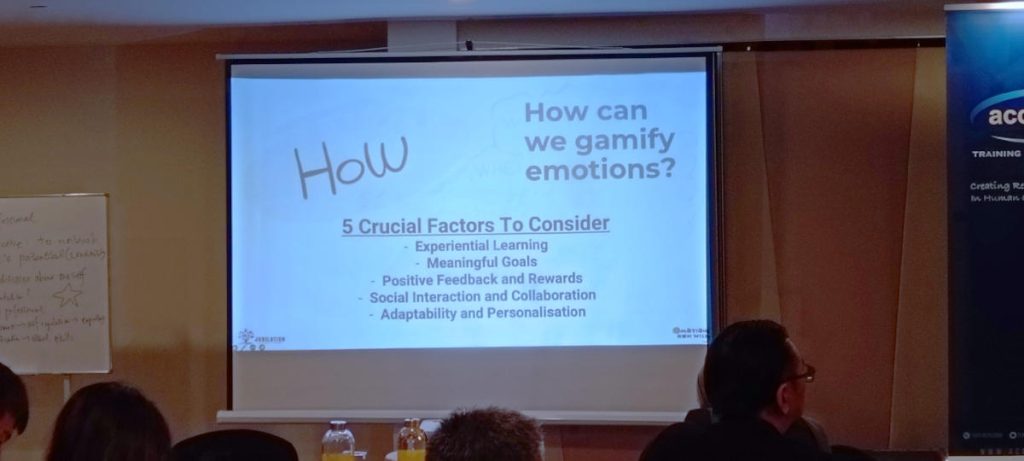
Social interaction and collaboration are important in TTRPGs
Meanwhile, out in the hallway the Accordia team were busy selling a number of games.
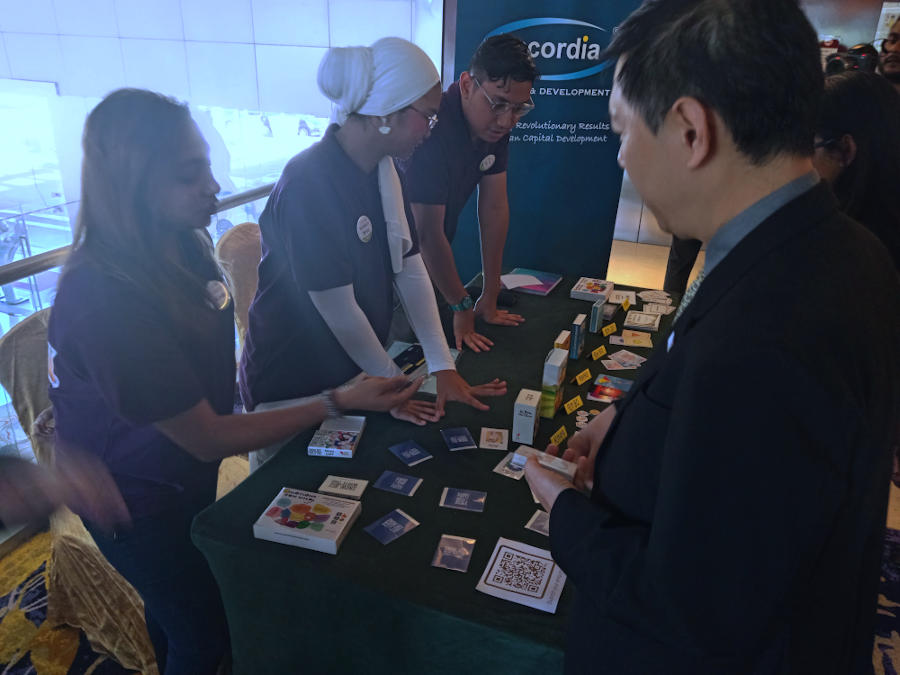
The games vending table
Dr. Mohammed Razeef Shah of UiTM Shah Alam was the final speaker of the day. His talk, entitled “Game Design Alchemy: Essential Storytelling Strategies for Aspiring Game Designers”, was of interest to me. Application of TTRPGs is mostly collaborative storytelling. I was interested in the six essential storytelling elements, namely Plot, Character, Conflict, Setting, Resolution and Theme. Dr Razeef teaches his students how to use these to write excellent narratives for computer games. He also introduces the Odyssey Story Deck a card game that facilitates storytelling.
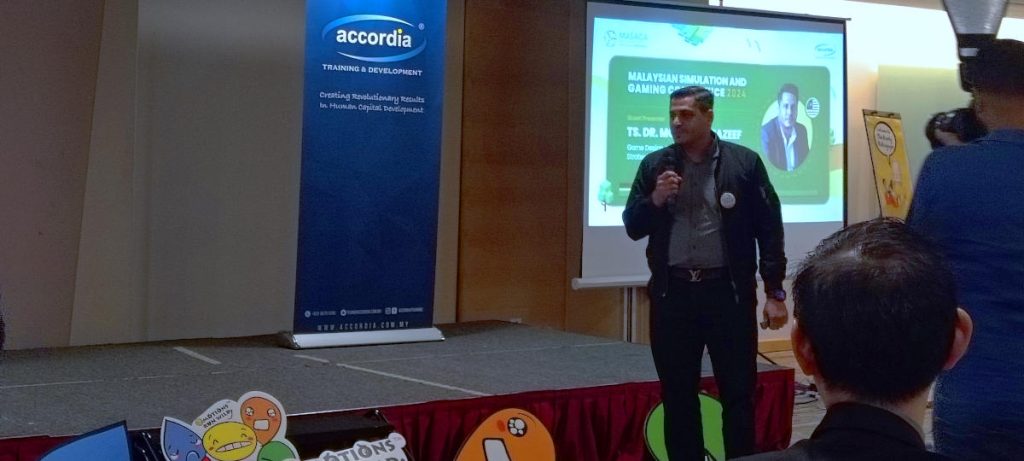
Dr. Razeef presenting how storytelling benefits games in general
As a TTRPG gamemaster, I am forced to consider what discrete factors would affect these elements as one is running a scenario. For example, plot begins with the GM but it might follow a route based on players’ collective decisions. Furthermore GM and players need to agree upon elements like Setting and Theme before creating characters.
We broke into groups again and we received random storytelling elements to create a Plot of our story. Our notes can be read below. Sadly, we were out of time, so we could not present our story: “Love on Planet Masaga!”
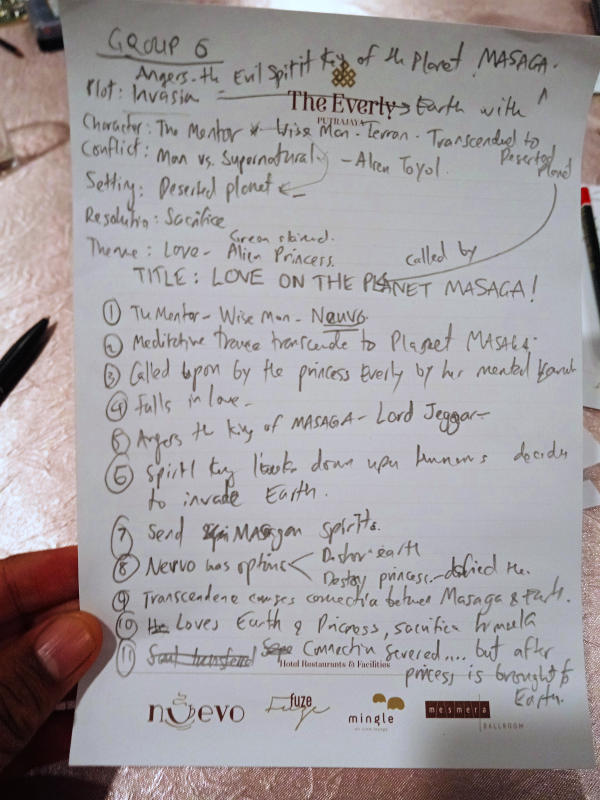
Alien Toyol did you say? No we cancelled that
Day Two
The second day begins!

My table for the morning
On the second day, we played Hippo Crates. Raiva Rohini — an educator from India who uses games to teach — moderated the session by throwing us different winning objectives. Raiva titled her talk “The Game of Learning: The Education of Board Games”.
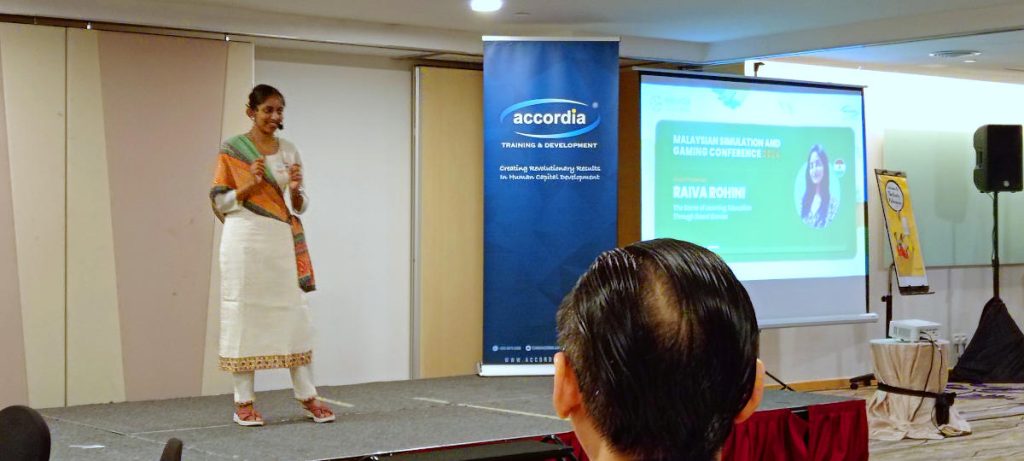
Raiva and her brother came all the way from India to present.
She used the cards to analogise between the hippo colour and what’s known Pramana – a means to knowledge. I believe TTRPG scenarios could be optimised for learning if I focus on three of the Pramanas, namely Upamana (comparison), Anumana (inference), and Arthapatti (postulation).
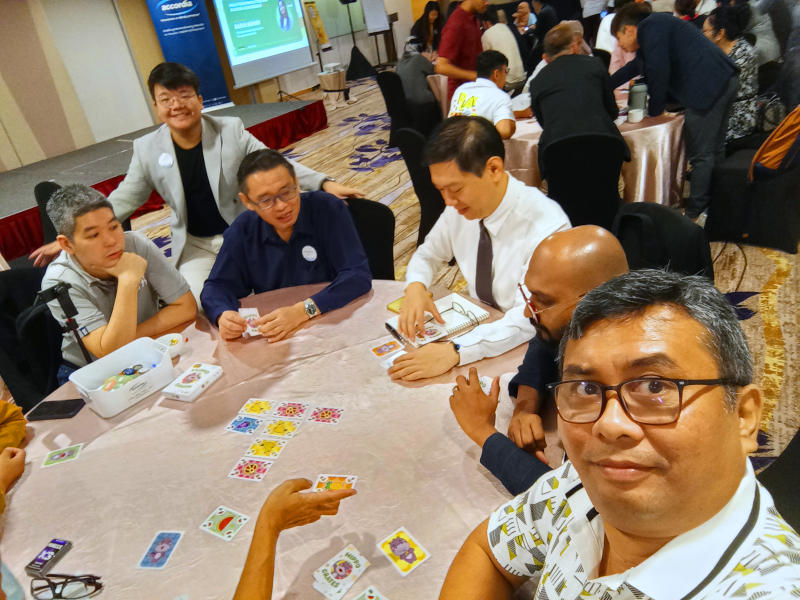
Hippo Crates was simple but could be played with a variety of endgames
Sudden Criminals
Next, there were two breakout rooms and I opted to join Hew Chok Sien.
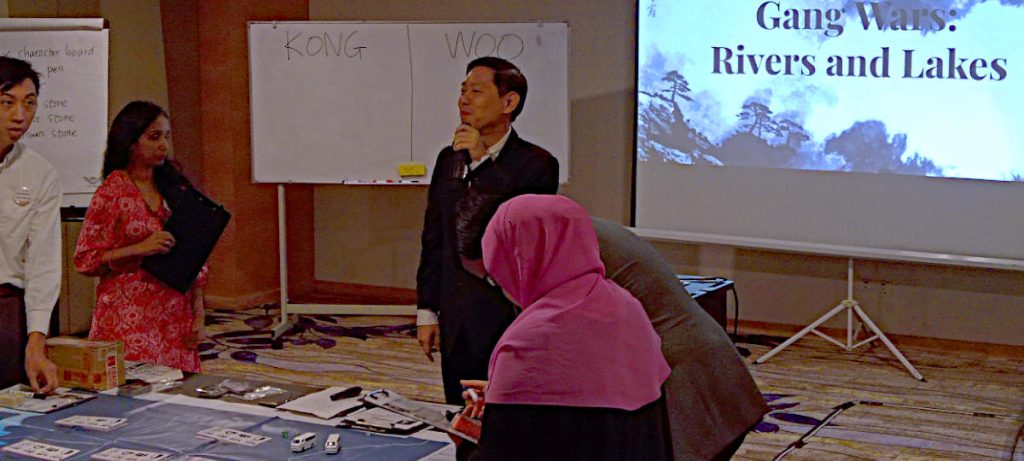
“Rivers and Lakes” is a pun
He ran a game entitled Gang Wars: Rivers and Lakes which he usually plays in corporate training sessions. The game simulates a cinematic gang war popularised in 1990s Hong Kong movies. Players had roles. I played Sandy Lau, a “senior” Kong gang member. I handled transpo for travel… and to invade the other Woo gang’s territories. Players from each gang has to communicate with each other and discuss with the “boss”. Then all must simultaneously declare what they want to do using coloured pebbles.

A mix between Sandy Lam and Andy Lau no doubt
The twist is that some players have secret Personal Goal cards that might compel them to act against the gang. Quite an immersive game. We even yelled threats in character for fun to the players on the opposite side of the room.
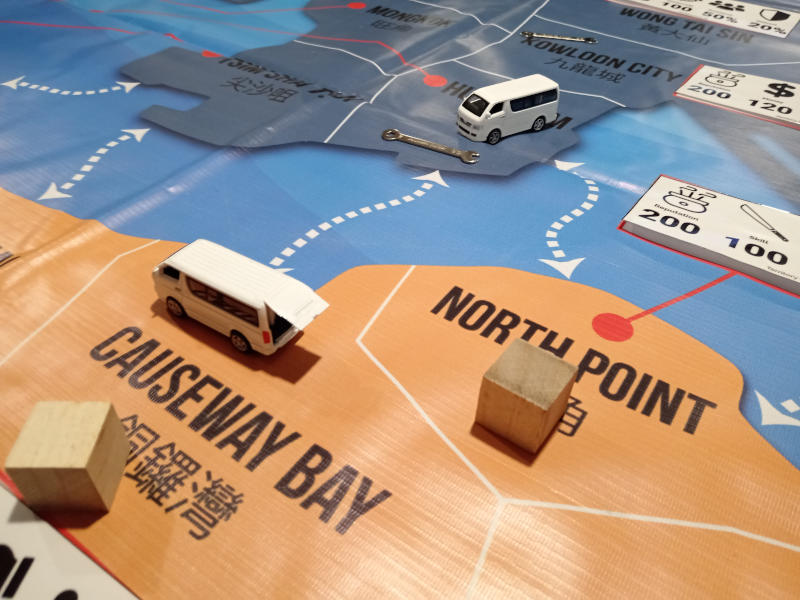
From our base at Causeway Bay, we took over North Point in Hong Kong
Sudden Binturong and Baskin Robbins
The last game I played that day was My Rain Forest, a beautifully designed card game that helps players understand ecology of tropical jungles. Leong Qin Ye moderated the session, entitled “Blending Knowledge, Skills and Attitude into Board Game Design”. Upon playing the card game, I was able to have a sense of how plants’ relations with arthropods, small animals, large animals and carnivores. Of course you had to play the best network of cards to score the highest points.
Geeta Veerappan then began the first of two final presentations entitled “Engaging Minds Through Gamified Learning”. She works teaching student-teachers on how to teach with games in Perak. They playtest their games with B40 schools in the district, allowing the student-teachers to experience during training how games allow schoolchildren to learn better in classrooms.
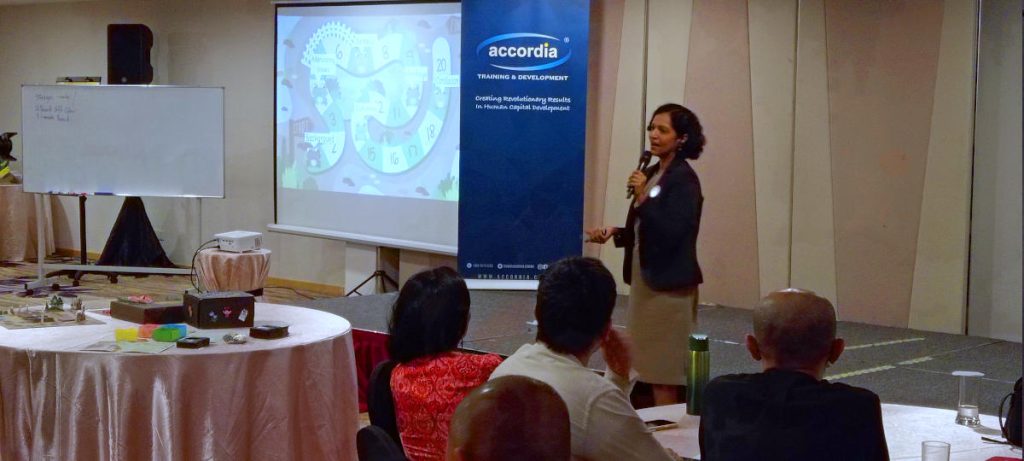
Geeta presents something her student-teachers created
The final presentation was not so much a presentation, but an actual scavenger hunt that required us to use language-based clues to look for “treasure”. In this case, treasure were shop names in the neighbouring mall Alamanda. We broke into teams and went out on foot to look for the treasure.
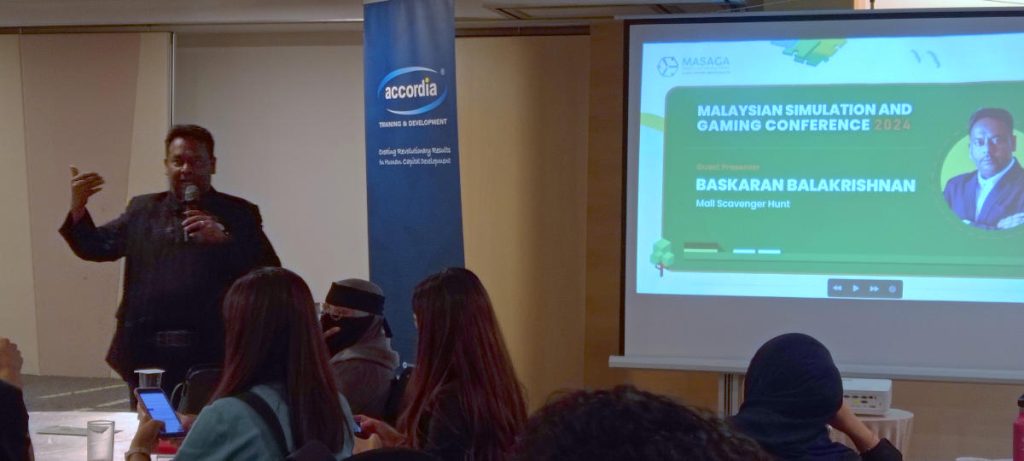
Scavenger Hunts have been a thing in Malaysia for years
In his summary of the “Mall Scavenger Hunt”, Baskaran Balakrishnan — who has been organising scavenger hunts in the country for many years — illustrated the physical and mental skills involved to complete the hunt. As a fun aside, our tie breaker activity was to smell a packet of mixed spice and identify the disparate smells. Our group — Group 6 — won second place.
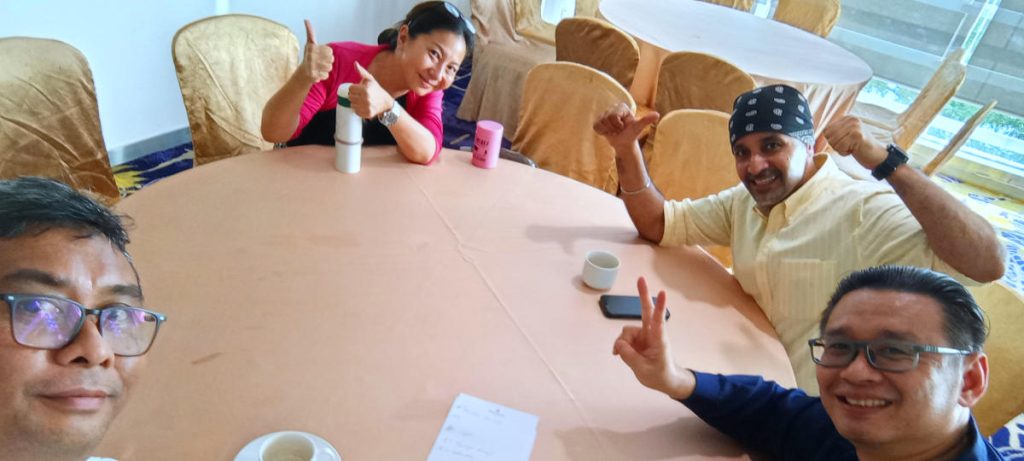
Four out of five members of Group 6
Day Three
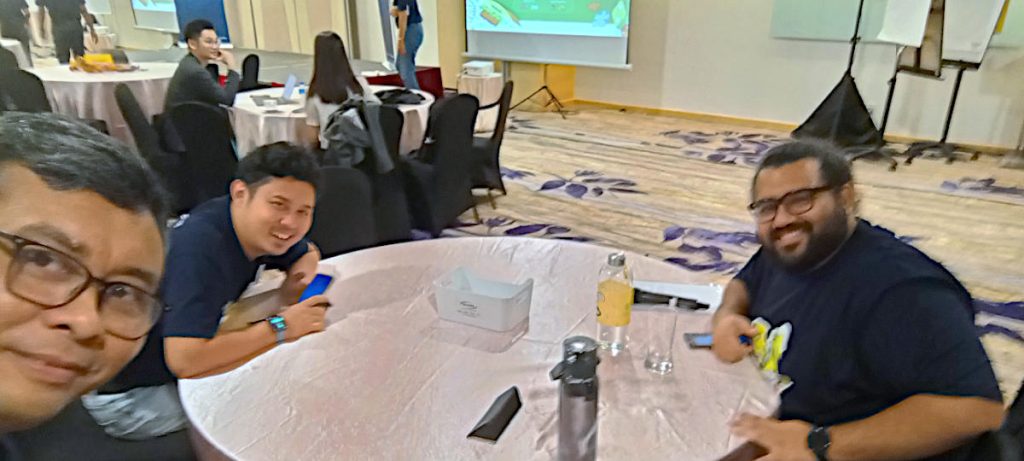
First thing in the morning
Early on the last day, Brian Remer took the stage once again with the presentation and activity entitled “Learning Through Metaphors”. The three main ideas I believed I acquired from the conference were:
- Storytelling structure in games. There were a lot of ideas from Dr. Razeef’s talk, i.e. using storytelling in a optimised manner to engage learners in class. I do not teach my students storytelling, but how can I use it to encourage their language, creativity and problem solving skills.
- Emotional intelligence in game scenarios. Jones Liew certainly had the dense spectrum of emotions with which I could determine which ones would be perfect to engage learners.
- Understanding player level (i.e. age, education) for game design. Many speakers talked about creating scalable games. These should be adaptable for different groups of players, or trainees. This is something for me to think about when engaging with my own students.
Sudden Metaphors and Jenga
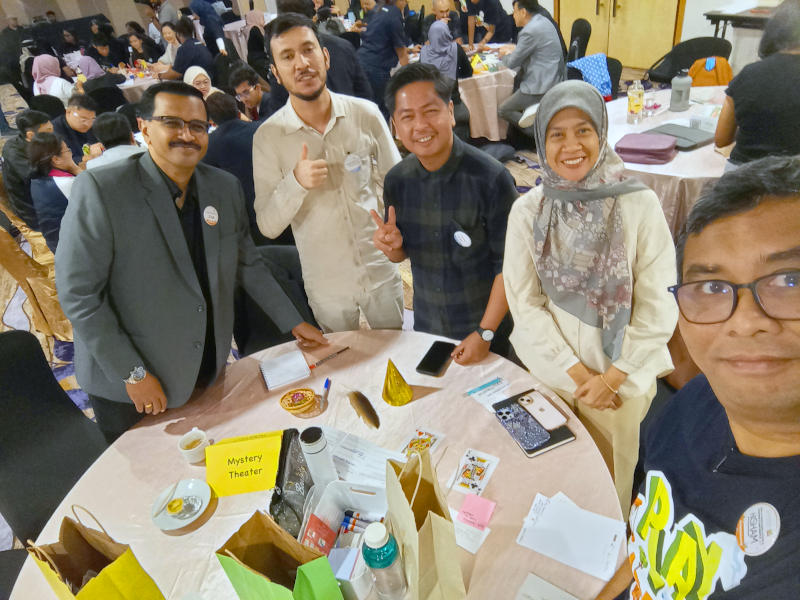
Our theatre group for the morning
We broke out into different groups for different activities, which were entitled “Picture This”, “Your Animal Nature”, “Grandma’s Attic”, among other things. Our group’s assignment: “Mystery Theatre”. We were given a set of props on our table and we used it to stage a play. I played the metaphor of “happiness” as I jiggled a ball in a wicker cup beside the participant who played the King in our play. Sadly I do not have a photo of our play.
Also, during tea break participants played My Rain Forest at the Mezzanine cafe.
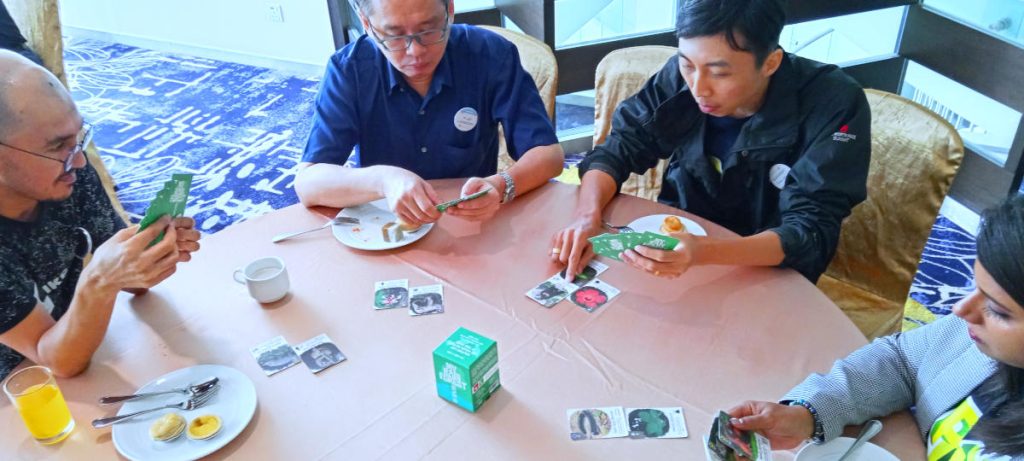
Playing cards rather than having tea or coffee? Must be a gaming conference
Then it was Jega’s turn to present in “Connecting Game Mechanics to Learning Objectives”. I do have Course Learning Objectives at work, so I thought I should listen carefully. The activity trained us to look for define objectives of a game we are designing. Then, upon playing it look for objectives that we failed to identify upon designing. Then keep analysing the game play to look for even more hidden objectives. Throughout this process, we would be able to play test and present our game instructions to players.
Our tool to explore this was Jenga.
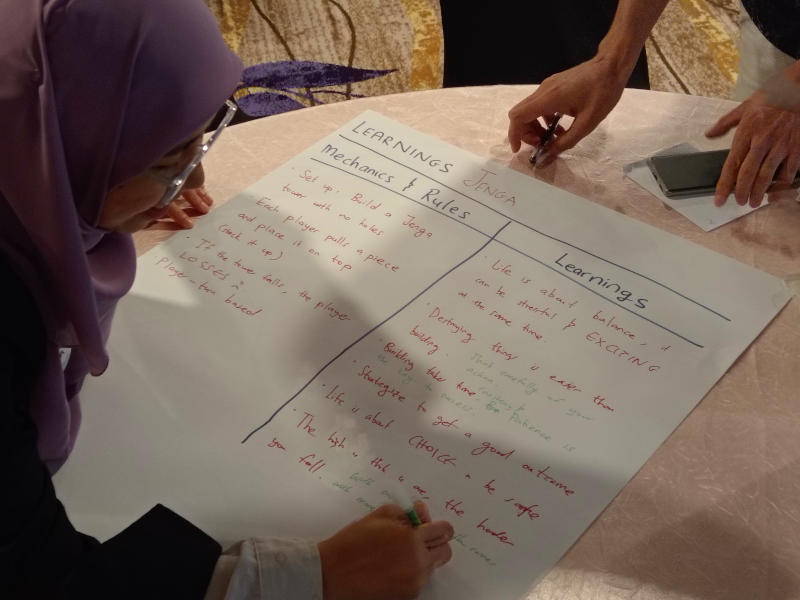
Ultimately I think Jenga has very little variations in moves and mechanics to produce any fun learnings
Sudden Me On Stage
Finally it was my time for my presentation. I entitled it “Tabletop Role-playing Games: A Versatile and Untapped Education Tool” because THEY ARE! Irfan helped to record a video of the talk, but somewhere near the end of the talk we lost audio. I might have accidentally hit the off button on my lapel microphone. I might need to edit shorts of my talk instead of released it whole later.
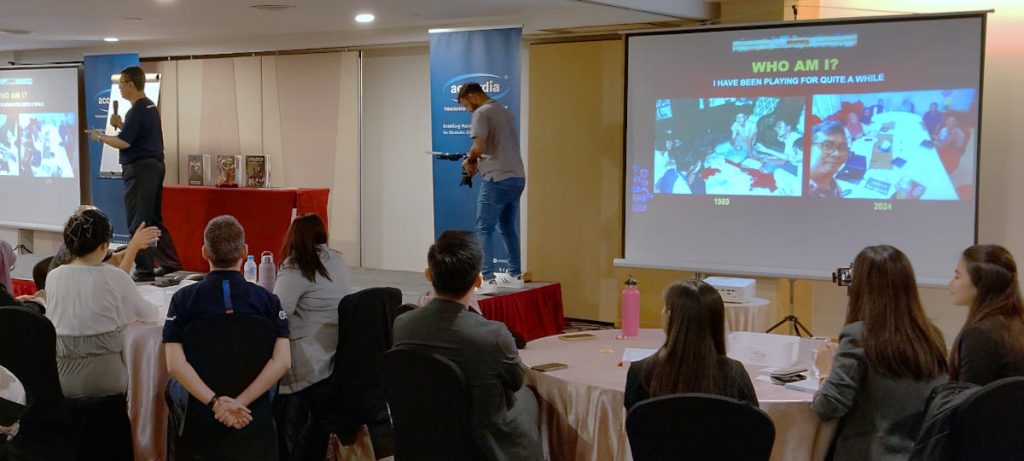
Pitching TTRPGs as versatile and untapped learning tools
So anyway I talk about who I am, why I think TTRPGs were the bee’s knees, how they could benefit students, what I have done with them in my classrooms and what books, settings, genres and sourcebooks are available. Not to mention the idea of writing and publishing our own TTRPGs for education that are customised for our own syllabuses. On the table on stage, I arrayed The One Ring, TimeWatch and Cortex Prime rulebooks as decorative samples.
After the talk, I ran a Mini Six game for the attendees. I will write an actual play report of that in another blog post.
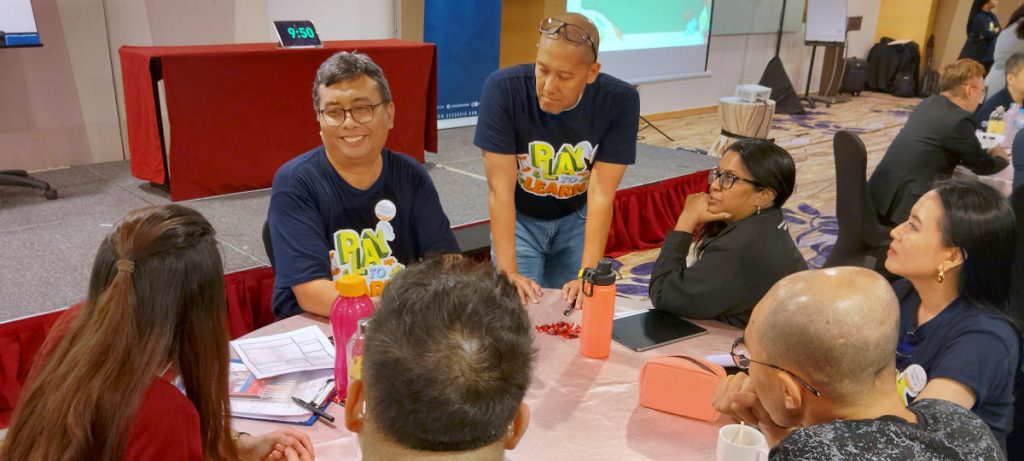
My Q&A table, flanked by co-founder Muhamad Zairulnizam
During the recap of learning session, every speaker hosted Q&A session. Groups of attendees move from table to table to ask questions. This was an invaluable session as I received plenty of good feedback about my talk. Additionally, they also asked a lot of questions on how to adapt TTRPGs for corporate training, team building and other non-academic training sessions.
Sudden Ending
At the end of the event, I felt a mix of sadness because of the ending, but also an excitement as I learnt a number of things that can aid me in optimising TTRPGs to teach language to students. Besides that, I even acquired ideas on using TTRPGs effectively for corporate training. MASAGA 2024 was a blast and I was happy I was able to attend as a representative of UniMAP.
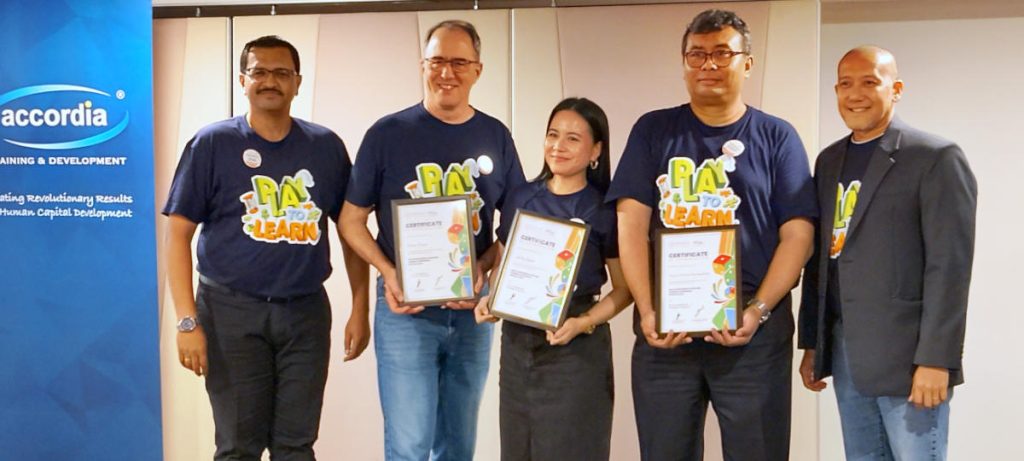
A new experience for me
Thanks again to Jega, co-founder Muhamad Zairulnizam, speaker wrangler Juliana Philips, master of ceremony Daryll, and the entire Accordia team for an engaging, fun and unforgettable experience.

